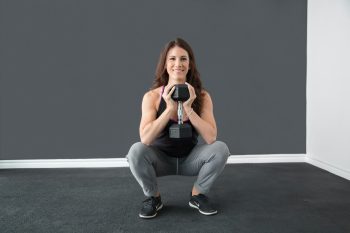Home / Health & Wellness Articles / Recovery /
Three reasons to make exercise part of your recovery

Being physically active is important for everyone’s health, both physical and mental. People diagnosed with chronic diseases such as diabetes and heart disease are often told they can help manage their symptoms with regular exercise. Some mental health challenges, like substance use disorder, are also chronic conditions that can benefit from physical activity. No matter your situation, exercise can be a beneficial part of your journey. Let’s look at three reasons why:
1. Exercise helps keep you physically and mentally healthy.
According to the Centers for Disease Control and Prevention (CDC), regular exercise can:
- Reduce feelings of anxiety and depression
- Help you sleep better
- Help control your weight
- Reduce your risk of heart disease, type 2 diabetes, and some cancers
- Strengthen your muscles and bones, which will help prevent injuries
2. Exercise can help your brain heal and can reduce cravings.
People with substance use disorders have rewired their brain over time. By replacing the brain’s natural ability to produce certain chemicals, users begin to use more and more substances to tell the brain to mimic the production of a certain chemical to obtain a specific feeling quickly. As this continues, the brain stops producing this chemical naturally and relies on the substance use.
When people enter into recovery, the brain is confused, it has to begin trying to figure out when and how much of these chemicals to begin producing naturally. The ups and downs of chemical production can lead to emotional ups and downs for the person in recovery. This can be very difficult to manage, especially for people in early recovery.
Exercise can be a way to encourage the brain to begin naturally producing these chemicals again. This can help the brain heal by beginning to regulate the production of chemicals. This can also reduce cravings.
As the brain learns to make the chemical on its own again, the person will have less desire to manufacture this feeling through substance use.
3. Exercise can add structure to your day.
People in recovery, especially early recovery, are often faced with the problem of how to fill their time or trying not to overschedule their days.
Learning to plan your day and stick to it can go a long way toward successful recovery. Making sure things like telehealth counseling, meetings, work, family time, doctor appointments and, yes, even exercise are parts of your day that can be helpful in making sure you are taking care of all of your priorities, including taking care of you.
Seeing exercise as an appointment with yourself is a great way to be sure it is part of your daily routine. Use your calendar on your phone to set reminders for appointments, upcoming events and your daily workout.
Of course, before beginning any exercise routine you should always consult your physician.
Typical recommendations for exercise are 150 minutes of moderate exercise per week. This can be broken down into smaller periods such as 30 minutes, five days a week, or 20 minutes, seven days a week. You can break those down further if you are just beginning. Take a 10-minute walk after each meal and you will have met your daily 30-minute goal.
Once you start exercising, you will begin feeling healthier, start to regain your self-confidence, and hopefully even begin to look forward to it every day. As you start to feel better, another perk of exercising regularly will be a disappearance of many of those aches and pains we often feel as the years go by.
If you or someone you know is experiencing mental health or substance use challenges, Centerstone can help. Visit our services page or call 877-HOPE123 for more information.


